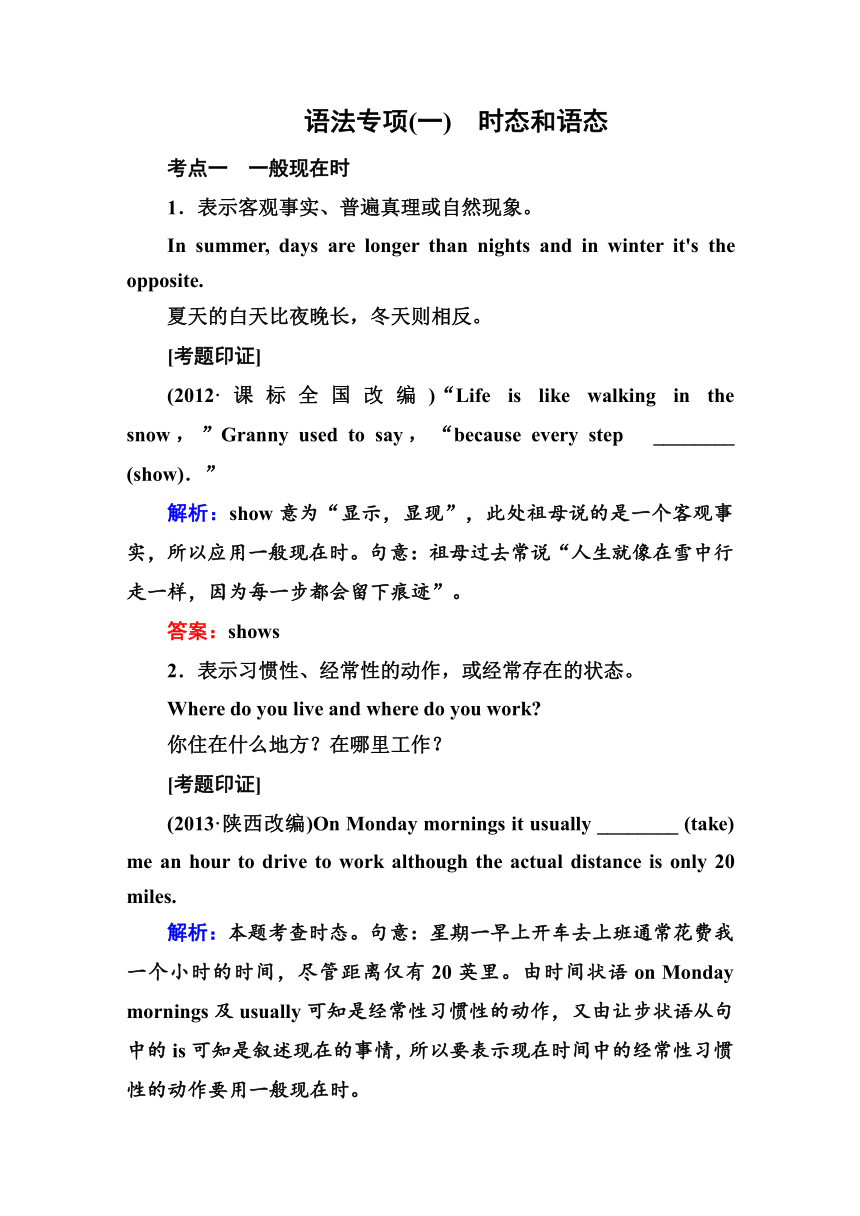
语法专项(一) 时态和语态 考点一 一般现在时 1.表示客观事实、普遍真理或自然现象。 In summer, days are longer than nights and in winter it's the opposite. 夏天的白天比夜晚长,冬天则相反。 [考题印证] (2012·课标全国改编)“Life i s like walking in the snow,”Granny used to say,“because every step _____ (show).” 解析:show意为“显示,显现”,此处祖母 说的是一个客观事实,所以应用一般现在时。句意:祖母过去常说“人生就像在雪中行走一样,因为每一步都会留下痕迹”。 答案:shows 2.表示习惯性、经常性的动作,或经常存在的状态。 Where do you live and where do you work 你住在什么地方?在哪里工作? [考题印证] (2013·陕西改编)On Monday mornings it usually _____ (take) me an hour to drive to work although the actual distance is only 20 miles. 解析:本题考查时态。句意: 星期一早上开车去上班通常花费我一个小时的时间,尽管距离仅有20英里。由时间状语on Monday mornings及usually可知是经常性习惯性的动作,又由让步状语从句中的is可知是叙述现在的事情,所以要表示现在时间中的经常性习惯性的动作要用一般现在时。 答案:takes 3.表示感觉、态度、感情、某种抽象的关 系或概念的词常用一般现在时,这些单词有:see,hear,smell,taste,feel,notice,believe,like,hate,want,think,belong,seem等。 It is made of silk and feels soft. 它是用蚕丝做的,摸起来很软。 4.在时间、条件和让步状语从句中常用一般现在时代替一般将来时。但要注意在由if引导的条件状语从句中可以用will表“意愿”,但不表示时态。 What will you do if it rains tomorrow 如果明天下雨你们做什么? [考题印证] (2013·全国Ⅰ改编)If we _____ (act) now to protect the environment, we'll live to regret it. 解析:本题考查动词时态。句意:如果我们不行动起来保护环境,我们会后悔的。根据主句的时态及从句中的now可知,条件从句要用一般现在时态。 答案:don't act 5.表示按时间表拟定或安排好要发生 的动作,常用动词有:come,go,leave,arrive,fly,return,start,begin,open,close,end,stop。 The shop closes at 11:00 p.m. every day. 商店每天在晚上11点关门。 The flight takes off at 2:30 every Wednesday and Friday. 飞机每星期三、五2:30起飞。 答案:C 考点二 一般过去时 1.表示过去的事情、动作或状态,常与表示过去的时间状语连用(或上下文语境有暗示);用于表示过去的习惯;表示说话人原来没有料到、想到的事。 [考题印证] (2013·安徽改编)I'm calling about the apartment you _____(advertise) the other day. Could you tell me more about it 解析:本题考查时态。句意: 我打电话是为前几天你打广告的一所公寓。你能告诉我更多的内容吗?根据时间状语the other day可知句子要用一般过去时态。 答案:advertised 2.表示两个过去紧接着发 生的动作,常由以下词语连接,用一般过去时。如:but,and,when,as soon as,immediately,the moment,the minute。 He bought a watch but lost it. 他买了一块手表但丢了。 3.表示过去经常、反复发生的动作。 表示过去经常、反复发生的动作时句子中常用always,usually,often,sometimes,never等。 We often went out f or a walk after supper when we lived in the countryside. 我们在乡村住的时候经常晚饭后出去散步。 4.描述几个相继发生过的动作。表示在过去特定时间内一次完成的具有先后顺序的几个动作时,常用过去时,此时一般不出现表示过去的时间状语。 Tom was late. He op ene ... ...
~~ 您好,已阅读到文档的结尾了 ~~